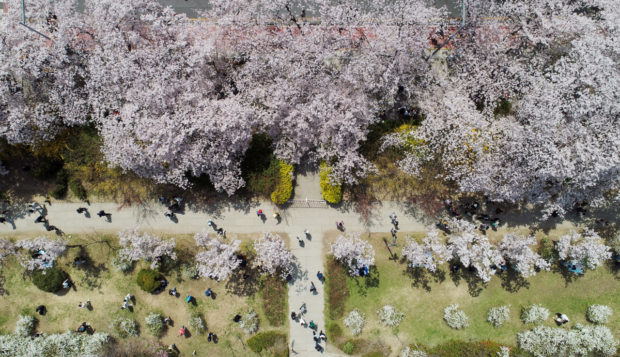South Korea finds first case of Omicron’s newer version, XL

Seoulites picnick on Sunday at a reverside park in Yeouido, central Seoul, where cherry blossom trees are in full bloom. South Korean health officials say the remaining social distancing restrictions may end April 18 as Omicron wave recedes. (Yonhap via The Korea Herald/Asia News Network)
SEOUL — The first case of an Omicron recombinant variant, XL, was discovered in South Korea, the Korea Disease Control and Prevention Agency announced Tuesday.
The XL patient, who tested positive on March 23, was boosted with a third dose, had no recent travel history and showed a mild disease course, said Lee Sang-won, the head of the KDCA’s epidemiological analysis team, during a briefing Tuesday.
XL is one of about 17 combinations of Omicron’s two sublineages BA.1 and BA.2 that are dominating the outbreaks across the globe.
In the last week of January, Korea found its first six cases of BA.2 just as BA.1 — the original Omicron virus –became dominant. By the third week of March, BA.2 showed up in 56 percent of local cases.
The KDCA says the incidence of recombinant Omicron variants is low in Korea despite “substantial monitoring.” But it is unclear how much whole genomic sequencing is occurring nationwide.
Article continues after this advertisementThe KDCA is unable to give a specific figure on how many cases have been whole-genome sequenced.
Article continues after this advertisementIn a written response to The Korea Herald’s requests for a percentage of samples sequenced since Omicron’s dominance here, the KDCA said, “As the number of confirmed cases has increased, there is no specific percentage of confirmed cases that are subject to whole-genome sequencing. Rather, analysis is being carried out from time to time within the scope of our capacity.”
The impact of the Omicron’s set of many recombinant variants is “likely limited,” according to Lee.
“There was a period when both BA.1 and BA.2 were circulating, but they overlapped for only a brief while, relatively speaking,” he said. “Their transmissibility has increased compared to BA.2, but based on data so far, there’s no evidence the recombinant variants are associated with more severe disease.”
The KDCA also announced that in an analysis of 9,243,907 cases that were confirmed since the beginning of the pandemic up to March 19, 0.284 percent or 26,239 cases were “suspected reinfection.”
Suspected reinfection is defined as a positive test after 90 days have elapsed since the primary infection regardless of symptoms. A positive test following symptoms or exposure at least 45 days from the first infection is also considered a suspected reinfection.
RELATED STORIES
South Korea begins discussion on ending restrictions as COVID-19 cases fall
Omicron ‘sub-variant’ throws up new virus questions
The uncertainty of treating Omicron as sign of pandemic end game
For more news about the novel coronavirus click here.
What you need to know about Coronavirus.
For more information on COVID-19, call the DOH Hotline: (02) 86517800 local 1149/1150.
The Inquirer Foundation supports our healthcare frontliners and is still accepting cash donations to be deposited at Banco de Oro (BDO) current account #007960018860 or donate through PayMaya using this link.